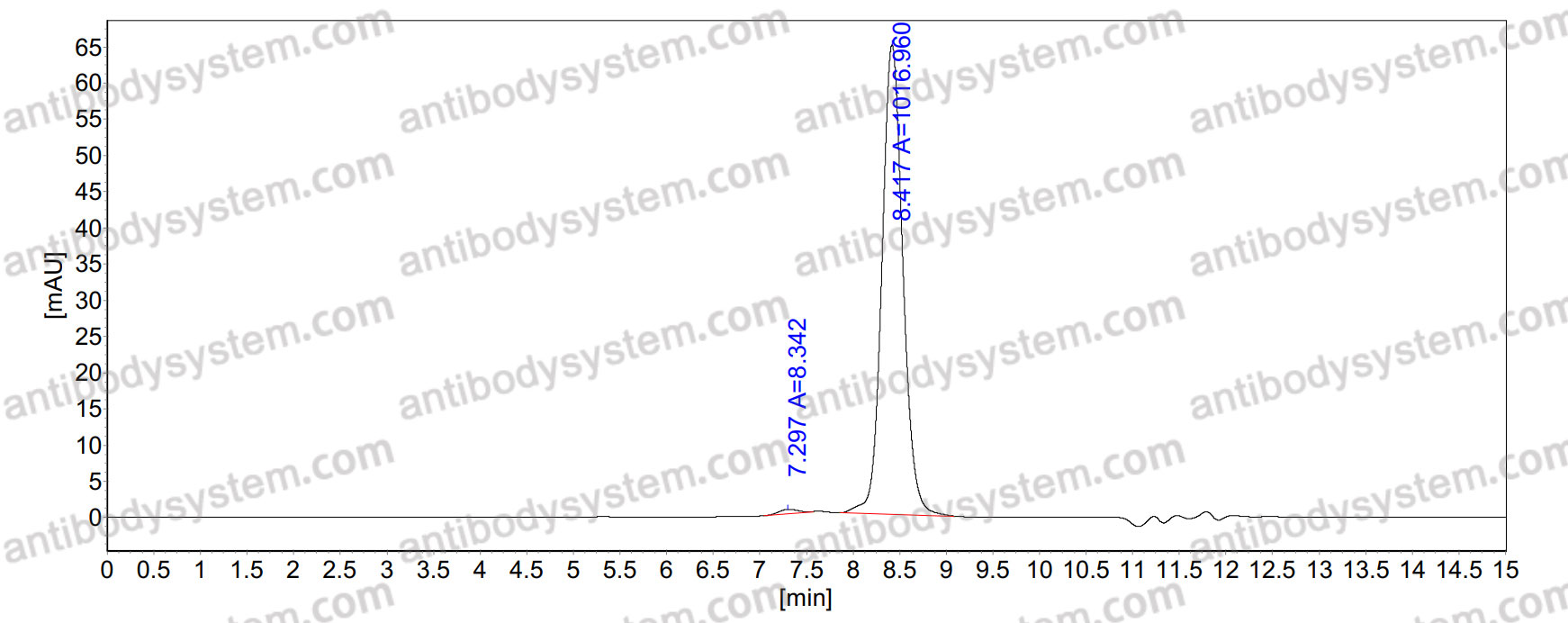Catalog No.
DHD29602
Expression system
Mammalian Cells
Species reactivity
Human
Host species
Human
Isotype
IgG2
Clonality
Monoclonal
Target
Pituitary adenylate cyclase-activating polypeptide, ADCYAP1, PACAP, PACAP-38, PACAP38, PACAP-27, PACAP27, PRP-48
Concentration
0.77 mg/ml
Endotoxin level
Please contact with the lab for this information.
Purity
>95% as determined by SDS-PAGE.
Purification
Protein A/G purified from cell culture supernatant.
Accession
P18509
Applications
Research Grade Biosimilar
Form
Liquid
Storage buffer
0.01M PBS, pH 7.4.
Stability and Storage
Use a manual defrost freezer and avoid repeated freeze-thaw cycles. Store at 4°C short term (1-2 weeks). Store at -20°C 12 months. Store at -80°C long term.
Clone ID
Anti-Human PACAP38 Antibody (Ab22
PACAP and migraine., PMID:40442928
PACAP38-induced migraine attacks are independent of CGRP signaling: a randomized controlled trial., PMID:40229719
Distribution and Neurochemical Characterization of Dorsal Root Ganglia (DRG) Neurons Containing Phoenixin (PNX) and Supplying the Porcine Urinary Bladder., PMID:40214470
Revisiting substance P in migraine: a methodological approach inspired by anti-CGRP and anti-PACAP success., PMID:39891050
Regulatory T cells require peripheral CCL2-CCR2 signaling to facilitate the resolution of medication overuse headache-related behavioral sensitization., PMID:39528947
Pituitary adenylate cyclase-activating polypeptide signalling as a therapeutic target in migraine., PMID:39256637
A New Antibody Treatment for Migraine., PMID:39231350
A Monoclonal Antibody to PACAP for Migraine Prevention., PMID:39231342
VPAC1 and VPAC2 receptors mediate tactile hindpaw hypersensitivity and carotid artery dilatation induced by PACAP38 in a migraine relevant mouse model., PMID:39085771
Same same, but different: exploring the enigmatic role of the pituitary adenylate cyclase-activating polypeptide (PACAP) in invertebrate physiology., PMID:38940930
Pituitary cyclase-activating polypeptide targeted treatments for the treatment of primary headache disorders., PMID:38887982
Targeting the PACAP-38 pathway is an emerging therapeutic strategy for migraine prevention., PMID:38337150
From CGRP to PACAP, VIP, and Beyond: Unraveling the Next Chapters in Migraine Treatment., PMID:37998384
Development of a New Enzyme-Linked Immunosorbent Assay (ELISA) for Measuring the Content of PACAP in Mammalian Tissue and Plasma., PMID:37894782
Emerging experimental drugs in clinical trials for migraine: observations and key talking points., PMID:37672405
Future targets for migraine treatment beyond CGRP., PMID:37370051
Peripheral CCL2-CCR2 signalling contributes to chronic headache-related sensitization., PMID:37284790
The effect of Lu AG09222 on PACAP38- and VIP-induced vasodilation, heart rate increase, and headache in healthy subjects: an interventional, randomized, double-blind, parallel-group, placebo-controlled study., PMID:37231350
Role of PACAP in migraine: An alternative to CGRP?, PMID:36481434
PACAP signaling is not involved in GTN- and levcromakalim-induced hypersensitivity in mouse models of migraine., PMID:36471250
PAC1, VPAC1, and VPAC2 Receptor Expression in Rat and Human Trigeminal Ganglia: Characterization of PACAP-Responsive Receptor Antibodies., PMID:36430275
Localization of the neuropeptides pituitary adenylate cyclase-activating polypeptide, vasoactive intestinal peptide, and their receptors in the basal brain blood vessels and trigeminal ganglion of the mouse CNS; an immunohistochemical study., PMID:36387999
Recently approved and emerging drug options for migraine prophylaxis., PMID:35850597
From basic mechanisms to therapeutic perspectives in cluster headache., PMID:35674077
The PACAP pathway is independent of CGRP in mouse models of migraine: possible new drug target?, PMID:35136961
Calcitonin gene-related peptide and pituitary adenylate cyclase-activating polypeptide in migraine treatment., PMID:35066541
The Influence of an Adrenergic Antagonist Guanethidine (GUA) on the Distribution Pattern and Chemical Coding of Dorsal Root Ganglia (DRG) Neurons Supplying the Porcine Urinary Bladder., PMID:34948196
Monoclonal Antibodies Targeting CGRP: From Clinical Studies to Real-World Evidence-What Do We Know So Far?, PMID:34358126
Diabetes Affects the Pituitary Adenylate Cyclase-Activating Polypeptide (PACAP)-Like Immunoreactive Enteric Neurons in the Porcine Digestive Tract., PMID:34072110
Emerging Targets for Migraine Treatment., PMID:34003154
Current advances in the management of cluster headaches., PMID:33989098
PACAP Induces Light Aversion in Mice by an Inheritable Mechanism Independent of CGRP., PMID:33846231
Targets for migraine treatment: beyond calcitonin gene-related peptide., PMID:33840777
Blue light induces the nuclear translocation of neuropeptide receptor PAC1-R associated with the up-regulation of PAC1-R its own in reactive oxygen species associated way., PMID:33647387
Pituitary adenylate cyclase-activating polypeptide/vasoactive intestinal peptide (Part 2): biology and clinical importance in central nervous system and inflammatory disorders., PMID:33481421
An outlook on the trigeminovascular mechanisms of action and side effects concerns of some potential neuropeptidergic antimigraine therapies., PMID:33470852
Peptides, MAbs, Molecules, Mechanisms, and More: Taking a Stab at Cluster Headache., PMID:33448373
Monoclonal antibody against Nile tilapia (Oreochromis niloticus) IgM heavy chain: A valuable tool for detection and quantification of IgM and IgM+ cells., PMID:33348037
A phase 2, randomized, double-blind, placebo-controlled trial of AMG 301, a pituitary adenylate cyclase-activating polypeptide PAC1 receptor monoclonal antibody for migraine prevention., PMID:33231489
Neurochemistry of Enteric Neurons Following Prolonged Indomethacin Administration in the Porcine Duodenum., PMID:33013401
The G Protein-Coupled Receptor PAC1 Regulates Transactivation of the Receptor Tyrosine Kinase HER3., PMID:32964398
Targeting pituitary adenylate cyclase-activating polypeptide (PACAP) with monoclonal antibodies in migraine prevention: a brief review., PMID:32877252
Tracing the Origins of the Pituitary Adenylate-Cyclase Activating Polypeptide (PACAP)., PMID:32508559
PAC1 receptor blockade reduces central nociceptive activity: new approach for primary headache?, PMID:32142016
No pain, no gain? The effects of pain-promoting neuropeptides and neurotrophins on fracture healing., PMID:31715336
Novelty in Inflammation and Immunomodulation in Migraine., PMID:31686633
Long-term treatment with naproxen changes the chemical coding of the porcine intramural duodenum neurons., PMID:31610253
PACAP38 improves airway epithelial barrier destruction induced by house dust mites allergen., PMID:31522781
Characterisation of vasodilatory responses in the presence of the CGRP receptor antibody erenumab in human isolated arteries., PMID:31284729
[New horizons for acute and prophylactic treatments of migraine]., PMID:31274104

